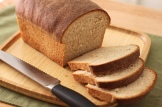Of all the major nutrients, carbohydrates have gotten a pretty bad rap. Personally, I don’t think it’s justified.
Carbohydrates are the core energy source for our body and brain and can be converted into amino acids to serve as the building blocks for protein. Certain sources of carbs are also chock-full of nutritious vitamins, minerals and fiber.
 Grains, milk, beans, fruit and starchy vegetables, like potatoes and corn, all contribute to our daily carbohydrate intake. In fact, the U.S. government suggests we consume 45-65% of our daily calories from this nutrient group. So why the notoriety?
Grains, milk, beans, fruit and starchy vegetables, like potatoes and corn, all contribute to our daily carbohydrate intake. In fact, the U.S. government suggests we consume 45-65% of our daily calories from this nutrient group. So why the notoriety?
Not all carbs are created equal. There’s a big difference (nutritionally-speaking) between “refined” and “complex” carbohydrates. Refined carbs include chips, cake, candy, cereal, sweetened beverages (e.g., juice, lemonade, soda) and bread and pasta made with white flour. These foods are literally stripped of nutrients during processing. Due to their lack of fiber, they don’t fill us up and are digested quickly, causing our blood sugar to spike. Refined carbs contain few vitamins and minerals and likely end up replacing healthier foods in our diet. Eating too many of these foods can also lead to high triglyceride levels.
On the other hand, many complex carbohydrates are packed with nutrients. Examples include brown and wild rice, whole wheat pasta and bread, oatmeal, quinoa, bulgur and barley. Such whole grains are naturally low in fat and added sugars and supply iron, folate, zinc, magnesium, B-vitamins and fiber – a nutritional powerhouse. Fiber cannot be digested by the human body and therefore, this complex carb passes through our system without adding calories! Fiber can help lower cholesterol, regulate bowel function, reduce spikes in blood sugar, protect against colon cancer and help us lose weight by warding off hunger! The fiber in whole fruit is what makes it a much better choice than juice, which is high in sugar and calories and not a dieter’s friend.
When it comes to weight loss, the low-carb Atkins diet certainly gets a lot of press. However, weight loss occurs when you consume fewer total calories than your body needs, whether you’re cutting back on fat, protein or carbs. A sustainable strategy for weight loss should reduce calories from all nutrient groups, so that you do not feel deprived. Reduce your intake of sugary beverages, desserts and foods made with refined flour, like white bread and pasta and be sure to include nutrient-dense and fiber-packed sources of complex carbs in your meal plan!


